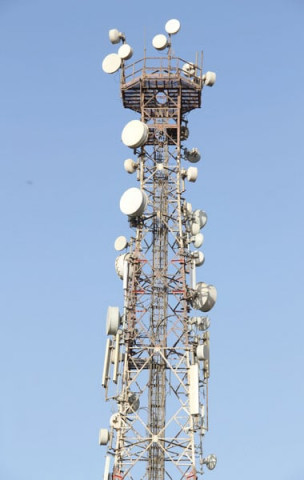Withholding tax on mobile banking services likely
FBR considering levy despite industry protests against high tax burden

PHOTO: AYESHA MIR /EXPRESS
Yet the tax authorities are not in a mood to offer any significant respite to the telecom sector except for removing the tax on cash withdrawals by branchless banking agents.
SBP develops ‘universal’ mobile phone app for financial transactions
The agents are currently paying up to 12% tax on the commission they earn from banks and 0.3% tax on cash withdrawals.
The proposal to withdraw the withholding tax on cash withdrawals by branchless banking agents has been given by the State Bank of Pakistan. The central bank is pursuing the National Financial Inclusion Strategy on the recommendations of global donors.

It believes that the tax on cash withdrawals by branchless banking agents could be a barrier to the goal of expanding banking services to half of the population by 2020. The agents have paid Rs110 million in withholding tax on cash withdrawals.
However, the FBR’s proposal to expand the scope of 0.4% withholding tax to mobile banking services is contrary to the targets set in the financial inclusion strategy. The government imposed the tax on all banking transactions in the hope of broadening the tax net, but it failed to achieve the objective.
Sector’s demands
The telecom industry has been complaining about heavy taxation for some time. In 2015-16, it paid Rs158 billion in taxes to federal and provincial governments, which constituted 34.7% of the sector’s total revenues of Rs455 billion.
Industry players have sought a reduction in withholding tax from 14% to 10% in the next financial year 2017-18. Though the demand appears to be realistic, the FBR is unlikely to accept it as it is a source of generating roughly Rs50 billion in revenues.
The FBR charges 14% advance tax from both prepaid and post-paid customers despite the fact many pre-paid customers are below the taxable income threshold of Rs400,000 per annum.
However, there is a possibility that the FBR may devise a mechanism to exclude poor segments from the levy.
Mobile subscribers pay more withholding tax than the consumers in other sectors. Many cannot reclaim what they pay as they don’t file tax returns.
The telecom operators have also sought reduction in federal excise duty (FED) and general sales tax (GST) rates from 19% to the standard 17%, abolition of FED and GST on data, SIM cards and IMEI number activation and reduction in import taxes. For the FBR, it is a wish list.
IT a must for economic stability: president
The heavy taxation serves only short-term objectives of the government and hurts its long-term plan of bridging the digital divide, according to an official of Telenor - one of the four mobile operators in Pakistan.
Owing to this, he said, Middle Eastern telecom players had pulled out of Pakistan. Oman Tel, Qtel and Warid have left the market in recent months.
For a consumer, the cost of saying hello for the first time is Rs2,250 due to taxes on mobile sets, SIM cards and IMEI numbers, according to the industry people.
The government has to play a major role in addressing the problem since 31% of the cost of acquiring and using a mobile is paid in taxes. This will help to make the services and phones more affordable for all layers of society.
The industry said the Rs250 SIM tax placed a cost barrier in the way of acquiring a mobile that was imposed regardless of the ability to pay. It should be abolished.
Published in The Express Tribune, May 5th, 2017.
Like Business on Facebook, follow @TribuneBiz on Twitter to stay informed and join in the conversation.



















COMMENTS
Comments are moderated and generally will be posted if they are on-topic and not abusive.
For more information, please see our Comments FAQ